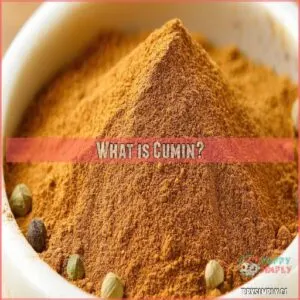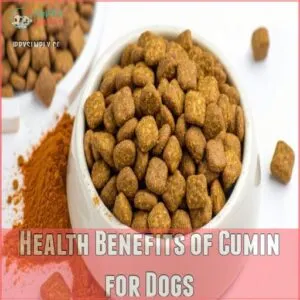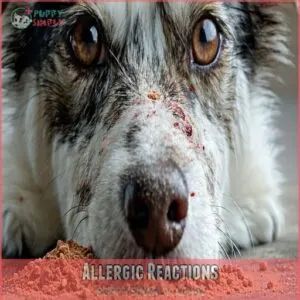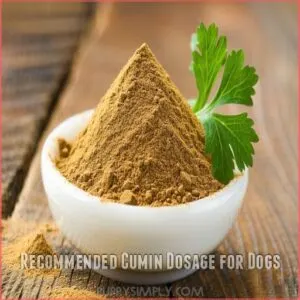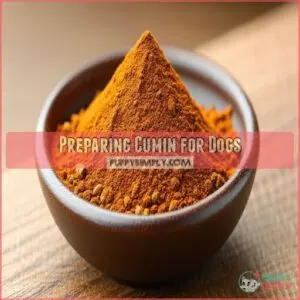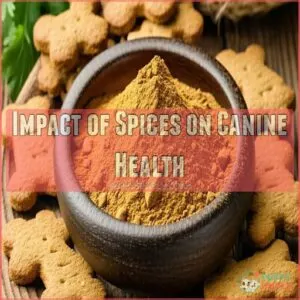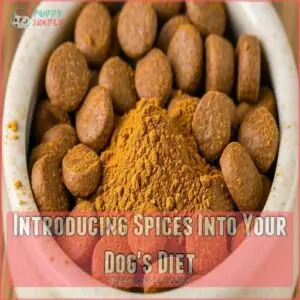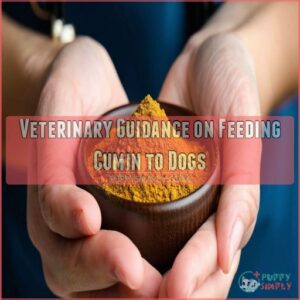This site is supported by our readers. We may earn a commission, at no cost to you, if you purchase through links.
 Can dogs eat cumin powder? A little bit won’t hurt, but it’s best to keep it in moderation.
Can dogs eat cumin powder? A little bit won’t hurt, but it’s best to keep it in moderation.
Think of it like your own spice rack – a pinch adds flavor, but a whole spoonful might be overwhelming!
Too much cumin can upset your pup’s tummy, causing digestive issues.
A tiny sprinkle on their food is fine, especially if you’re making homemade treats.
However, always introduce new foods gradually.
You wouldn’t want your furry friend experiencing a culinary catastrophe, would you?
Want to know the perfect amount of cumin for your dog and some delicious recipes? Read on to discover more!
Table Of Contents
- Key Takeaways
- What is Cumin?
- Can Dogs Eat Cumin Powder?
- Health Benefits of Cumin for Dogs
- Risks of Feeding Cumin to Dogs
- Recommended Cumin Dosage for Dogs
- Preparing Cumin for Dogs
- Impact of Spices on Canine Health
- Introducing Spices Into Your Dog’s Diet
- Veterinary Guidance on Feeding Cumin to Dogs
- Frequently Asked Questions (FAQs)
- Can dogs eat cumin?
- How much cumin powder should one intake each day?
- Can cumin kill a dog?
- What happens if a dog eats too much cumin?
- Can cumin cause diarrhea in dogs?
- How much cumin should a dog eat?
- What seasoning is safe for dogs?
- How much cumin powder is safe?
- What herbs can dogs not eat?
- Is black cumin safe for dogs?
- Does cumin affect a dog’s weight?
- Can puppies eat cumin powder safely?
- Are cumin seeds safe for dogs?
- How often can dogs have cumin?
- Does cumin affect dog’s bowel movements?
- Conclusion
Key Takeaways
- You can give your dog cumin powder in small amounts; just be careful, as too much can cause digestive issues like gas or diarrhea.
- Always introduce cumin gradually into your dog’s diet and keep an eye out for any allergic reactions or stomach upsets.
- Cumin may offer minor health benefits for dogs, such as supporting digestion and providing antioxidants, but moderation is key.
- Before adding cumin to your dog’s meals, it’s best to consult your vet to ensure it’s the right choice for your pup’s diet and health conditions.
What is Cumin?
Cumin comes from the seeds of the Cuminum cyminum plant and is part of the parsley family.
It’s a popular spice in many kitchens, adding a unique flavor to dishes worldwide.
Cumin Seed Origin
Imagine cumin seeds as tiny culinary treasures growing in the heat of the Mediterranean and Southwest Asia.
The cumin plant flourishes under the sun, thriving in these regions where cultivation methods are as ancient as spices themselves.
Similar to the consideration of animal health in the development of veterinary medicines and foods, human food cultivation also demands careful consideration of its impact on the environment and living organisms.
Traditionally harvested by hand, cumin undergoes thorough seed processing, ensuring you get that potent, earthy flavor in every sprinkle.
Nutritional Value of Cumin
Ever thought about the nutritional punch cumin packs? It’s rich in:
- Iron for energy levels
- Calcium supporting coat health and bones
- Vitamins B6 and E boosting immunity
- Fiber aiding digestion
You can explore various cumin products for your dog on websites that offer Cumin for Dogs Supplies.
However, remember that these benefits are mostly for humans, so consult your vet for canine use.
Common Uses of Cumin
So, you know cumin’s packed with nutrients.
But where does it shine?
Think cumin in curries, adding warmth.
Or cumin in rubs for that smoky BBQ flavor.
It’s fantastic in marinades, too, tenderizing meat.
Love dips?
Cumin adds a zesty kick.
You’ll even find it in many spice blends.
It’s incredibly versatile!
Can Dogs Eat Cumin Powder?
When considering adding cumin to your dog’s diet, it’s important to understand the nuances. Cumin powder, a staple in many kitchens, isn’t toxic for dogs, but moderation is key. Giving your dog too much can stir up a storm of digestive issues.
- Cumin Safety: Small amounts are generally safe, but watch out for any changes in your dog’s behavior or digestion.
- Dog Allergies: As with any new food, keep an eye on allergic reactions like itching or stomach upset.
- Cumin Recipes: Introduce cumin in minimal amounts mixed with food, never as a standalone treat.
- Cumin and Puppies: Skip the cumin for puppies; their digestive systems are still maturing.
Focusing on balance and talking to your vet can help make sure a safe introduction to this spice.
Health Benefits of Cumin for Dogs
You might wonder if cumin offers health benefits for your furry friend, and surprisingly, it does, to some extent.
While dogs can’t benefit like humans, cumin may support digestive health and energy levels even in small quantities.
Anti-inflammatory Properties
Looking to ease your dog’s joint pain?
Cumin’s anti-inflammatory effects might just help with canine arthritis.
Think of it as nature’s gentle remedy, like turmeric, offering subtle relief.
While a typical dog food ingredients list might include high-quality protein sources like chicken, beef, fish, and lamb, which provide essential amino acids, animal-based proteins. While you won’t find cumin listed among dog food ingredients as a cure-all, adding it in moderation could supplement their diet.
Always consult your vet for the best approach.
Antioxidant Properties
Imagine cumin as a tiny but mighty helper for your dog’s health.
It’s packed with antioxidants that fight free radical damage, potentially boosting your dog’s immune system and reducing oxidative stress.
Think of these antioxidants as a canine superhero cape, defending against cellular damage.
But, remember moderation is key to keep things safe and beneficial for your furry friend.
Digestive Health
Although cumin’s antioxidant perks might catch your attention, its contribution to dog digestion shouldn’t be overlooked.
This spice, while primarily aiding people, is rich in fiber which can support your furry friend’s gut health.
Remember, though, some dogs with food sensitivities mightn’t celebrate this addition.
Like a finicky dining partner, every pup’s tummy tells its own story.
Boosting Energy Levels
If your dog food choices aren’t cutting it and tired pups need a lift, cumin might be a game-changer.
Known for potential energy-boosting benefits, this spice could inject a little pep into your dog’s step, especially for breeds that require intense physical activity like energetic dog breeds for active owners.
However, energy supplements like cumin aren’t one-size-fits-all—exercise impact and breed differences matter.
Always consult your vet before introducing new foods.
Risks of Feeding Cumin to Dogs
While cumin is generally safe for dogs in small amounts, there are potential downsides to keep in mind.
Too much cumin can upset your dog’s tummy, causing gas or diarrhea, so always introduce it gradually and watch for any problems.
Allergic Reactions
While giving your pooch a sprinkle of cumin, watch for cumin allergy symptoms like itching, swelling, or sneezing.
Cumin intolerance in dogs isn’t common, but it’s not impossible.
If you spot cumin reaction signs, reach out to your vet for a proper cumin allergy diagnosis.
Cumin allergy management might involve steering clear of this spice entirely.
Digestive Issues
Sensitive stomachs can make cumin a risky addition to your dog’s diet.
Even a sprinkle might lead to stomach upset, causing issues like gas or diarrhea.
Picture Fido’s discomfort as he experiences a gassy evening—it’s not fun for anyone!
So, if your pup has food sensitivities, tread lightly with cumin and always keep an eye out for any digestive reactions.
Overconsumption
Overindulging in cumin can lead to digestive upset that leaves your dog uncomfortable, much like when we devour too many spicy tacos!
Too much cumin may cause gastrointestinal issues, including diarrhea and nausea.
Moderation is key to sidestepping cumin side effects, preventing any serious health risks.
Always keep an eye on portion sizes to avoid cumin toxicity.
Recommended Cumin Dosage for Dogs
When considering cumin for your dog, it’s important to carefully follow recommended serving sizes based on their weight.
Start with a small pinch to see how your furry friend reacts.
Always consult your veterinarian for guidance on safe amounts.
Factors Affecting Dosage
It’s kinda like solving a puzzle when figuring out how much cumin your dog can handle.
A few things to keep in mind include:
- Dog’s Weight: Larger dogs can handle more spice than the tiny ones.
- Age and Breed: Puppies and certain breeds might need different considerations, especially if they’re on a legume-free dog food diet.
- Tolerance Level: Each dog reacts differently, so watch out for any digestive upset or allergies.
Safe Serving Sizes
Imagine cumin’s like a pinch of spice just right for your furry friend.
Serving sizes should be based on dog size and cumin tolerance.
Larger breeds might handle up to a teaspoon, but for small pups, stick to a quarter teaspoon or less.
Consider breed variations and individual needs before you start experimenting.
Dosage guidelines keep your buddy safe and sound, ensuring they’re not biting off more than they can chew!
Preparing Cumin for Dogs
You can easily incorporate cumin into your dog’s diet.
Just remember to start with tiny amounts and gradually increase the quantity.
Always keep a close eye on your furry friend for any tummy troubles.
Adding Cumin to Food
Start by gently sprinkling cumin over your pup’s meal.
Just a pinch adds zest, enhancing flavor without overpowering.
Make sure your furry friend’s dish is one of their favorite dog food brands, mixing flavors seamlessly.
Always keep a keen eye out for any unusual behaviors afterward—like an unexpected dance routine!
Remember, cumin recipes should be about balancing benefits with safety concerns.
Baking Cumin Into Treats
Baking cumin into treats for your furry friend can be a fun exploration.
Always, make sure your ingredients are safe—cumin, just a dash, pairs well in homemade dog treats.
Avoid any sneaky cumin allergy surprises by starting small and watching for reactions.
It’s like crafting a culinary delight with cumin treat benefits—just keep an eye on your pup’s tummy happiness!
Mixing With Wet Food or Gravy
Adding cumin to wet food or gravy can enhance its flavor for your dog, especially if they’re a picky eater.
Just sprinkle a pinch into their favorite gravy recipes or mix it with wet food to experiment.
Remember, cumin in gravy should be introduced slowly to avoid any tummy troubles.
It’s like crafting homemade treats, but for everyday meals!
Impact of Spices on Canine Health
It’s important to remember that your dog’s digestive system is different from ours when it comes to feeding them spices.
Some spices, like cumin, can be safe in small amounts, but others should be on the no-go list to keep your furry friend healthy.
Differences in Human and Canine Digestion
Sprinkle a dash of cumin into your dog’s dish, and watch how their digestive enzymes react differently than yours.
Canine digestion isn’t quite the same as ours—they have unique gut bacteria and varied stomach acidity that affect fiber breakdown.
This unique balance can be disrupted by various factors, including diet changes, illness, and stress, compromising their digestive health and microbiome.
Such differences can lead to unexpected food sensitivities.
While cumin may add flavor, you should pay attention to how your pup’s system handles these new dietary elements.
Safe and Toxic Spices for Dogs
Dogs have a digestion system quite different from humans, making some spices risky. Here’s what to keep in mind:
- Garlic vs. Onion: Both are toxic and should never find their way into dog food.
- Safe Spice Blends: Stick to mild options like small amounts of turmeric.
- Pet Food Spice Risks: Avoid mixed spices; contact a vet for advice.
- Human Spice Dangers: Monitor for allergies or stomach upsets.
Introducing Spices Into Your Dog’s Diet
Adding spices to your dog’s food can be fun, but it’s important to do it safely and gradually.
Always consult your vet before making significant changes to their diet, especially if they’ve health issues.
Remember, a little spice can go a long way, so start with tiny amounts and watch for any tummy troubles.
Monitoring for Adverse Reactions
To make sure your furry friend’s safety, keep an eye out for any digestive upset when introducing cumin, as some dogs may experience cumin dog diarrhea issues.
If your dog starts vomiting, has diarrhea, appears lethargic, or develops a skin rash, it might be time to reconsider.
Think of your dog like a taste tester trying something new—keep it light and easy. Gradually adjust based on their reaction, making sure their well-being is your top priority.
Consulting a Veterinarian
When you’re shaking up your dog’s diet with cumin, it’s wise to chat with the vet first.
They help navigate any health concerns and suggest safe spice usage customized to your pup’s needs.
Vets can guide you on dietary restrictions, and potential cumin allergies, ensuring your furry friend munches safely.
After all, personalized advice keeps tails wagging and worries at bay, so it’s best to get expert insights.
Veterinary Guidance on Feeding Cumin to Dogs
When considering adding cumin to your dog’s diet, it’s important to consult your veterinarian for personalized advice that takes into account individual dietary needs and any existing health conditions.
This makes sure that you make informed decisions, keeping your furry friend’s health a top priority without any surprises.
Individual Dietary Needs
Just like humans have individual tastes, dogs also have unique dietary needs.
Dog food allergies or breed-specific diets can be key when adding cumin.
If your pup has food sensitivities, start small and watch for reactions.
Balancing cumin with dietary restrictions keeps mealtime fun yet safe, ensuring your furry friend thrives with each bite.
Existing Health Conditions
While adding cumin to a dog’s diet, it’s important to think about any existing health conditions.
Dogs with allergies, gastrointestinal issues, or specific dietary restrictions may react differently.
- Preexisting conditions might make cumin less suitable.
- Medication interactions could pose risks.
- Keep an eye out for allergies or discomfort.
Always have a chat with your vet when considering dietary changes.
Personalized Advice
Every dog is unique, like your favorite pair of shoes—what fits one might pinch another.
You can also explore specialized cumin dog treats online, but it’s important to consult with your vet before spicing up mealtime with cumin.
Chat with your vet about your dog’s breed, age, allergies, weight, and medications before spicing up mealtime with cumin.
Tailoring their diet promotes safety and health.
Veterinarians will personalize advice, so your pup’s diet suits their specific needs and avoids tummy troubles.
Frequently Asked Questions (FAQs)
Can dogs eat cumin?
Imagine feeding your dog a spicy taco, hoping they’d enjoy the kick!
Cumin is safe for dogs in tiny amounts.
It’s safe but could upset their stomach.
Consult your vet before adding it to their diet.
How much cumin powder should one intake each day?
Adults typically consume about one teaspoon of cumin powder daily for health benefits.
It’s packed with antioxidants and spices up dishes with a rich, earthy flavor.
However, always tailor this to personal health needs and preferences.
Can cumin kill a dog?
Think of cumin as a spice with mild manners; it won’t kill your dog.
In moderation, it’s safe.
But don’t let your guard down—too much can cause tummy troubles, so keep cumin portions small and cautious.
What happens if a dog eats too much cumin?
When a dog eats too much cumin, it might experience stomach issues like diarrhea or gas.
Sensitive pups could even feel nauseous.
Always start with small amounts and watch for any signs of discomfort or allergic reactions.
Can cumin cause diarrhea in dogs?
Yes, cumin can cause diarrhea in dogs if they consume too much.
It’s best to introduce it gradually, watching for any adverse reactions.
Start with a small pinch and see how your dog’s stomach handles it.
How much cumin should a dog eat?
It depends on your dog’s size.
Larger dogs might handle a teaspoon, while smaller ones should get a quarter teaspoon or less.
Always start with a tiny pinch and watch for tummy troubles.
What seasoning is safe for dogs?
Think of your dog’s diet as a cozy blanket—safe, warm, and comforting.
Cumin in small amounts, turmeric, basil, rosemary, and parsley are generally safe seasonings.
Always introduce gradually, and consult your vet for personalized advice.
How much cumin powder is safe?
Start with a pinch of cumin powder to see how your dog reacts.
For larger breeds, stick to a teaspoon; for smaller dogs, a quarter teaspoon or less.
Watch for any stomach upset or discomfort.
What herbs can dogs not eat?
You should keep dogs away from garlic, onions, and nutmeg.
These can be toxic, causing anything from stomach upset to serious health issues.
Always consult your vet before introducing any new herbs or spices to your dog’s diet.
Is black cumin safe for dogs?
Exploring herbs like a cautious treasure hunter, you’ll find that black cumin, or Nigella sativa, might pose risks for dogs.
While not outright toxic, it could cause digestive discomfort.
Consult your vet first.
Does cumin affect a dog’s weight?
Cumin doesn’t directly affect a dog’s weight.
However, it can promote minor health benefits when used sparingly.
Make sure it’s only a tiny part of their diet, as excessive amounts might cause digestive issues, which could indirectly impact weight.
Can puppies eat cumin powder safely?
Puppies shouldn’t consume cumin powder as their digestive systems are still developing.
Introducing spices to a puppy’s diet can lead to stomach upset.
Always consult your vet before adding new ingredients to your puppy’s meals.
Are cumin seeds safe for dogs?
Worried about cumin and your canine companion?
A tiny pinch is usually fine, but too much can upset their tummy.
Always check with your vet first; they’re the best judge of what’s safe for your furry friend.
How often can dogs have cumin?
You can add a pinch of cumin to your dog’s meal once or twice a week.
Always watch for any adverse reactions.
Too much cumin might upset your dog’s stomach, so moderation is key for their comfort.
Does cumin affect dog’s bowel movements?
Cumin can affect your dog’s bowel movements by causing diarrhea or excessive gas if consumed in large amounts.
Cumin is best introduced gradually, keeping an eye on any digestive upset or discomfort.
Conclusion
Surprisingly, while dogs can’t enjoy a full spice rack, cumin powder in moderation isn’t off limits.
A tiny sprinkle can offer benefits like improved digestion, thanks to its anti-inflammatory and antioxidant properties.
Yet, overindulgence might lead to unforeseen tummy troubles.
Observe your dog’s reaction and adjust as needed.
It’s always smart to consult a vet before spicing up mealtime.
Ultimately, by carefully considering cumin powder, you can enhance your dog’s diet safely and enjoyably.

